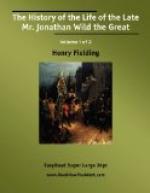As to its place among Fielding’s works, critics have differed considerably. The opinion of Scott found little in Jonathan Wild to praise, but then it is evident from what he says, that Scott missed the point of the satire. [Footnote: Henry Fielding in Biographical and Critical Notices of Eminent Novelists. “It is not easy to see what Fielding proposed to himself by a picture of complete vice, unrelieved by anything of human feeling. ..."]. Some other critics have been neither more friendly than Sir Walter, nor more discriminating, in speaking of Jonathan Wild and Smollett’s Count Fathom in the same breath, as if they were similar either in purpose or in merit. Fathom is a romantic picaresque novel, with a possibly edifying, but most unnatural reformation of the villainous hero at the last; Jonathan Wild is a pretty consistent picaresque satire, in which the hero ends where Fathom by all rights should have ended,—on the gallows. Fathom is the weakest of all its author’s novels; Jonathan Wild is not properly one of Fielding’s novels at all, but a work only a little below them. For below them I cannot help thinking it, in spite of the opinion of a critic of taste and judgment so excellent as Professor Saintsbury’s. When this gentleman, in his introduction to Jonathan Wild, in a recent English edition of Fielding’s works, says that: “Fielding has written no greater book,” he seems to me to give excessive praise to a work of such great merit that only its deserved praise is ample.
A great satire, I should say, is never the equal of a great novel. In the introductions which I have already written, in trying to show what a great novel is, I have said that an essential part of such a book is the reality of its scenes and characters. Now scenes and characters will not seem real, unless there is in them the right blend of pleasure and pain, of good and bad; for life is not all either one thing or the other, nor has it ever been so. Such reality is not found in a satire, for a satire, as distinguished from a novel, both conceals and exaggerates: it gives half-truths instead of whole truths; it shows not all of life but only a part; and even this it cannot show quite truly, for its avowed object is to magnify some vice or foible. In doing so, a satire finds no means so effective as irony, which makes its appeal wholly to the intellect. A good novel, on the contrary, touches the head and the heart both; along with passages which give keen intellectual enjoyment, it offers passages which move its reader’s tears. Still, a good novelist without appreciation of irony cannot be imagined, for without the sense of humour which makes irony appreciated, it is impossible to see the objects of this world in their right proportions. Irony, then, which is the main part of a satire, is essential to a good novel, though not necessarily more than a small part of it. Intellectually there is nothing in English literature of the eighteenth century greater than A Tale of a Tub or the larger




